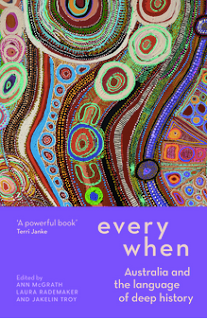Honestly, if I'd realised just how scholarly Everywhen was going to be, I might have thought twice about borrowing it, but I'm so glad I persevered. Some of the essays are deeply personal, like Jakelin Troy's account of standing between the snowy mountains of her ancestors and the sky, or Shannon Foster's reflections on being locked away from rock engravings around Sydney, on D'harawal land, in order to 'keep them safe.' There are pieces here that examine the role of music and song, that outline the way performance of ancient songs and stories helps to bring the deep past into the present moment, or the challenge for linguistics of trying to recover the languages lost since white settlement.
After the shock and despair of reading Killing For Country, it was heartening to explore these essays and to realise that there are so many people working so earnestly to preserve, to recover and to engage with the oldest living culture in the world, and hopefully to share a new perspective on what it means to live on and with our fragile planet.















No comments:
Post a Comment
0 comments